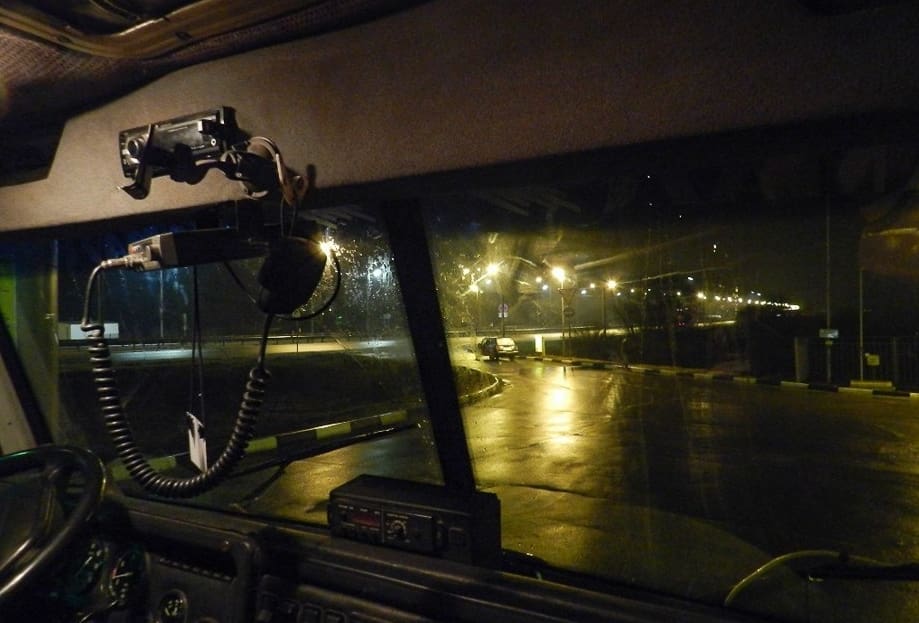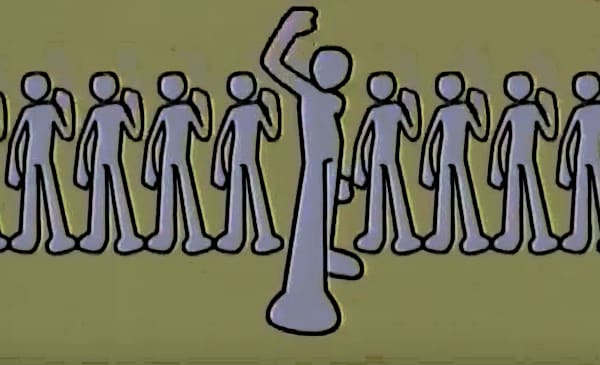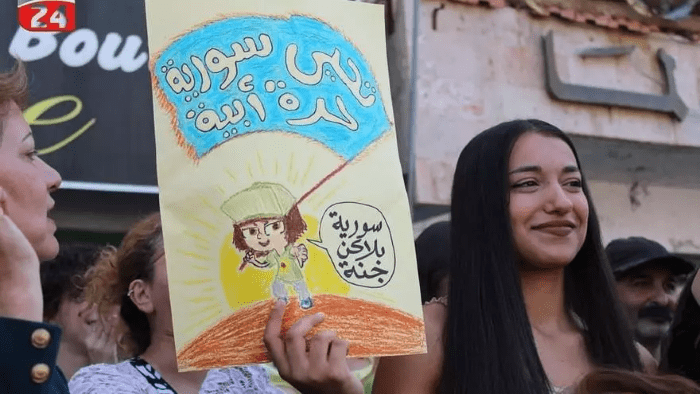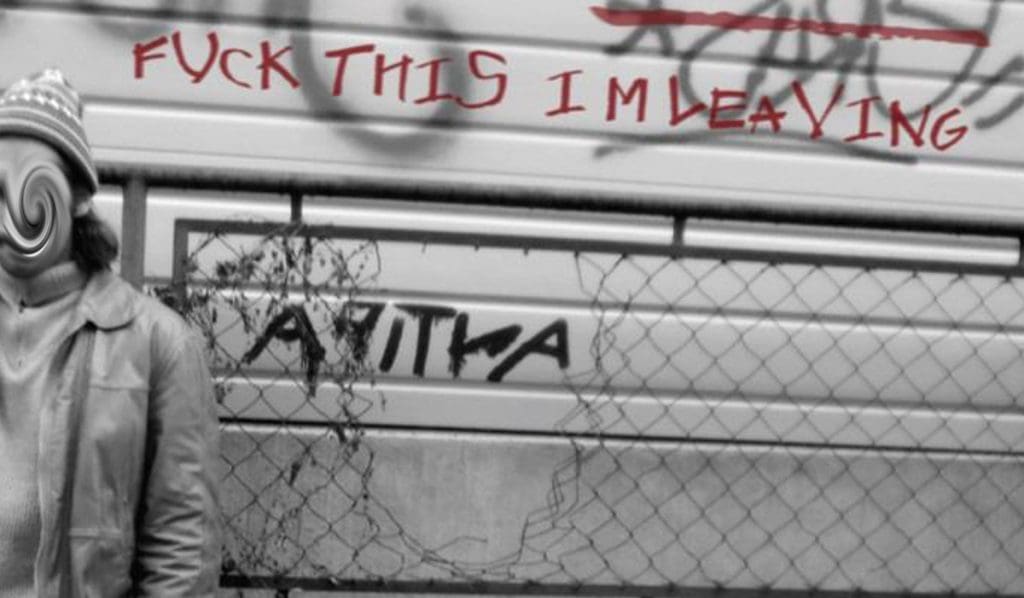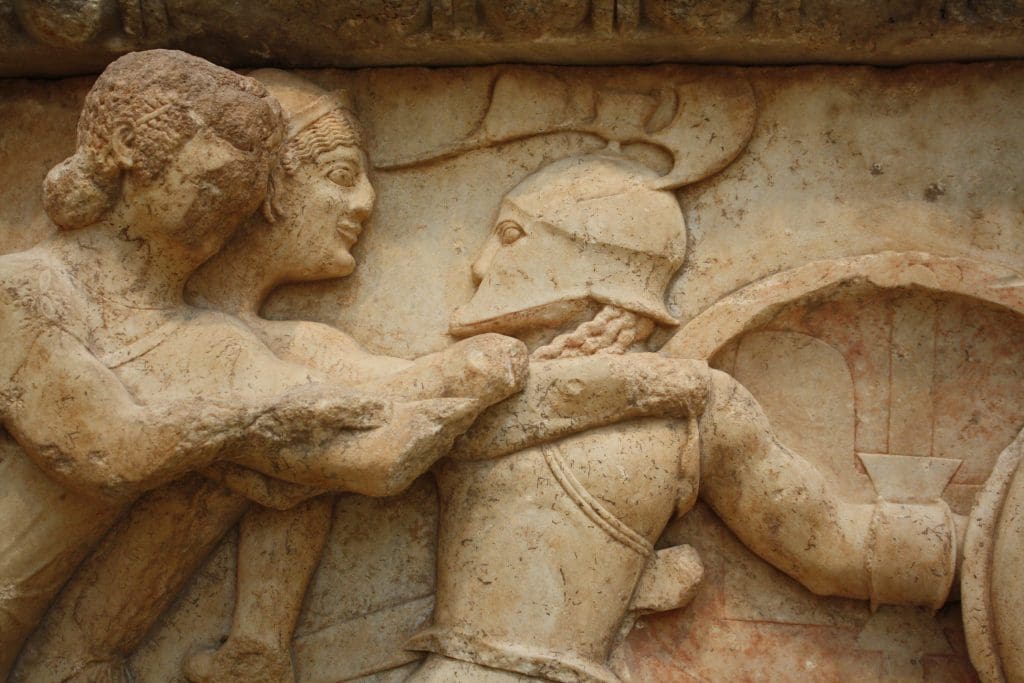AntiNote: This is part two of a pair of articles we are featuring from the Russian Reader, street-level testimony from people organizing and participating in struggles for their lives and livelihoods in ways we are encouraged to assume Russians don’t. Part one, interviews with young people at the large anti-corruption protest in Petersburg on 26 March, is here or in the arrow navigation below.
Once again we have not reproduced TRR‘s helpful link citations or all of the accompanying photographs (though we couldn’t resist the Russian pop video). We encourage the curious to find them in the original post in English, and then loiter around the site a bit and see what else you may have been missing.
“I Peeled Myself from the TV and Saw the Light”: Why Ryazan Truckers Are Planning to Join the Nationwide Strike
by Yekaterina Vulikh for 7X7
22 March 2017 (original post in Russian)
In early March, a video was published in which Sergei Ovchinnikov, an activist and long-haul trucker with the Association of Russian Carriers (OPR), announced a nationwide strike that would kick off in fifty regions of the country on March 27. As Ovchinnikov said, the strike would continue until the government sat down at the negotiating table or most goods had disappeared from store shelves.
The truckers’ demands:
1. The Plato road tolls payment system should be abolished or reorganized for transit transport and turned over to the state.
2. The transport tax should be canceled (There is already a fuel excise tax for this purpose).
3. Work and rest schedules of drivers should be adapted to the real conditions in Russia.
4. The government should resign, and no confidence in the president expressed.
5. Weigh stations should be made to do their job properly.
6. Carriers should be given grounds for how the fuel excise tax is calculated.
7X7′s correspondent went on a run with Alexei Borisov, coordinator of the OPR’s Ryazan branch, to check the validity of these demands.
“I didn’t want to be Father Frost anymore.”
“I have an old Kamaz. It rattles and growls, and the wind blows in through the door. It runs slow. Do you have motion sickness? It can give you motion sickness,” Alexei warns before our trip.
How do I know whether I have motion sickness? I don’t ride the big rigs every day. Honestly, I’ve never ridden in a big rig. I’ll be happy if I can climb into the cab.
Before the trip, Alexei and I agree we’ll address each other with the informal “thou” (ty). It’s extremely hard to maintain etiquette when you’re bouncing over bumps in the road and your teeth are chattering from night frosts. Also, Alexei repeats to me several times that he is a carrier, not a long-haul trucker. There is a difference.
9:00 p.m. We leave Ryazan headed for Moscow. Twenty tons of reinforced concrete slabs rumble on the nearly 14-meter-long trailer behind us. It’s dark and drizzling. The cab is hot and drafty at the same time. I hadn’t imagined the romance of the open road like this. I should have listened to an experienced wheelman earlier, instead of singer Tatyana Ovsiyenko’s tender voice.
We have left the remains of Ryazan’s pavement behind and are traveling down a good road illuminated here and there. Round midnight, the trees, ravines, and hoses on the roadsides merge into one continuous blur, and my eyes close.
“Did you get in some good sleep before the trip?”
“No, I had a lot of things to do.”
“How’s that?”
“As long as I’m talking, I’m fine. But I usually stop in a side lane and doze for fifteen minutes or so. It helps.”
“How much?”
“Another half an hour.”
So we talk about roads and school pranks, fuel prices and children, the remnants of green zones and the nuances of professions.
Alexei is a “hereditary” driver, as they say. His favorite pastime in childhood was riding the bus his father drove. Immediately after graduation, he got a job as a vehicle mechanic in Motor Convoy No. 1310, and then a job as a bus driver. He finished his studies to be licensed to drive articulated buses and, at the same time, trailer trucks.
“I transferred to Motor Convoy No. 1417, which services the passenger route between Ryazan and Moscow. They had just purchased Setra buses. Compared to our ancient Russian buses, they were simply a dream. And I was entrusted with one of these buses. I would sign off on the manifest and go off on my route in a white shirt and blazer. It was great, but after a while they cracked down on us. They made our work conditions harsher in the stupidest way, and in some cases they would just take the piss out of us,” recounts Alexei, irritated.
That was about six years ago. The stewardesses on the long-distance buses (not to be confused with airplane stewardesses) were forbidden to relax after they handed out food and drinks. They had to keep serving passengers for the entire trip, and smile to them even if they were drunk. Drivers were forbidden from getting free rides to work on buses from their own motor convoy. The next-to-last straw was the Father Frost suit Alexei was obliged to wear over the New Year’s holidays (the stewardesses were dressed, respectively, as Snow Maidens). The last straw was a fine for stretching his arms over the steering wheel for a couple of seconds. His back had gone to sleep, and he needed to move around a little. An observer saw him do this.
“I couldn’t stand it and I quit. Some might find it stupid. For example, a friend of mine still works there. After every new twist on the part of management, he would sigh and say, ‘They know better. If we’re not dealt with strictly, we’ll lose all fear.’ Why should I fear anyone? I was a responsible employee. I never argued with the passengers. I don’t drink. I don’t even smoke,” Alexei tells me buoyantly, meaning we’re going straight through without stopping.
12:00 a.m., Moscow Region. Through the murky window I notice road workers and convenient multi-level parking lots. A lot of new buildings are going up at a fair distance from the Moscow Ring Road, not as in Ryazan, where they are built right next to the the roads. Speaking of the roads: they exist, and they’re very good.
The big rig alternates between buzzing and barely dragging along, and calming down and cruising more briskly.
“My Kamaz truck is a bit old, and the trip is rough on it. On the other hand, it’s easier to maintain. Spare parts for foreign-made trucks cost so much the guys have to take out loans. The transport tax on them is higher. On the other hand, old trucks like mine won’t be allowed into cities. Right now, this truck feeds a family with two children. I haven’t thought about what I’ll do next.”
We turn off the Ring Road and drive into a pitch-dark neighborhood. The road has been paved with concrete slabs, but none too smoothly. Here and there, we bump along as if we are driving up steps. There is a shaft of light ahead and the outlines of high-rises.
2:05 a.m., a construction site in Mitino, our destination. According to Alexei, we must “now unload quickly and hightail it back,” to make it through Moscow during permitted hours. He disappears behind mountains of slabs, bricks, and god knows what else.
Another multi-ton rig is already waiting to unload.
My legs numb, I clamber out of the cab. There is frost. The puddles no longer chomp underfoot, but crackle. After stretching my legs and strolling round the half-deserted construction site, I climb back into the cab and look for the thermos.
Alexei comes back in a very bad mood.
“They’ll unload that rig over there now, and then the crane will be busy. They won’t get to us till morning, so we’re hardly going to get through Moscow before the Ring Road has been closed to trucks. There’s the option of bypassing the city on the A107, but that’s an extra 100 kilometers. So this run will be a loss for me. Or, we’ll wait and see. I’m going to pull down the bunk for you now. Do you want the sleeping bag?
Oh, what a sinner I am. Remembering all the unprintable expressions I know, I climb up on the bunk located behind the seats. At first, I “modestly” cover myself with my down jacket, but within five minutes I realize my ear, back, and feet are freezing, and I give up, asking Alexei whether I can have the sleeping bag after all. I warm up instantly and doze off. Through my drowsiness I can hear the rumble of a construction crane, the occasional shouts of workers, and the roar of caged packages of bricks being loaded.
Alexei settles down on the seats to sleep.
Marriage, the Photo Shoot, and the Big Bosses
5:50 a.m. Nearly sea-like pitching wakes me up. They’ve finally begun unloading our Kamaz. Nearby, a scandal is brewing.
It turns out one of the slabs is defective. The first “big boss” flatly refuses to sign for it. The second boss, who is even bigger and more important, orders it removed from the trailer and tossed “in that pile way over there.” He says the supplier has already sent them several defective slabs, but it’s not a disaster and not a rarity. It’s just that the building material has to go back to the supplier on one of their own trucks. We still cannot head home, because Alexei has to sign several papers, and they won’t be available until eight o’clock. Eight o’clock! Apparently, we’ll have to hang around in some dump until ten p.m.
For a while, I take pictures of the old Kamaz, the beautiful sunrise, and landscapes near and far. That is when I am detained until they “discover the purpose of the photo shoot.”
“Why are you shooting the construction site?” asks a heavyset guard.
“No reason,” I reply sincerely, “I’m shooting the truck.”
“You infiltrated the construction site in this truck?”
“Excuse me, what did I do? I infiltrated the site like a spy, and now I’m openly snapping pictures?”
I laugh, but just in case I hide my camera behind my back.
I’m asked to report to the boss, and then to another boss. The biggest security boss is surprised when I tell him the Plato toll rates have not been decreased, but are scheduled to go up. He clicks his tongue in sympathy, but still asks me to delete the shots where it is clear what residential complex this is.
“The tenants walk around shooting, and then they discuss the whats and wherefores on the internet. They complain regulations have been broken here. You can’t shoot here. It’s forbidden.”
“What regulations have been broken? Let’s talk about it.”
The boss politely but silently escorts me to the truck.
“What now?” I hopelessly ask my traveling companion.
“What now? We’re out of here!”
And yes, we’re driving on the Moscow Ring Road. It’s 7:40 a.m.
“We wanted to explain it all to Putin.”
“We’re going to be fined,” I predict.
“What’s the difference? Either we pay the fine or we fuel up for a 100-kilometer bypass. Or we wait until nightfall. You want to do that?”
I don’t want to do that at all. I ask Alexei how he got involved in the OPR and became a coordinator for them.
“It all kicked off in late 2015, when the authorities informed us Plato would be introduced. Working and surviving got noticeably tougher then: the dollar went up, and prices skyrocketed. Fuel and spare parts were suddenly like gold. But instead of instituting preferential terms of some kind for carriers, they hit us with Plato.”
[Note from the Russian Reader: The system’s name in Russian, Platon, is, technically, an abbreviation for “payment for tons,” but what comes to any Russian speaker’s mind when they hear the name Platon is not freight haulage tolls, but the great ancient Greek philosopher. Hence, throughout the numerous articles I have posted on the struggle of Russian truckers to band together and defeat what they regard as a death blow to independent trucking, I have consistently translated the term as “Plato,” because, in part, this is the only way to convey the boundless cynicism of the Kremlin insiders and cronies who christened their system for fleecing hard-working men and women with the name of a brave man who willingly accepted death rather than betray his convictions.]
“It was then that many headed to Moscow to seek the truth. We weren’t thinking about politics. We just wanted to explain to Putin we couldn’t work this way. Everyone would go bankrupt. We sincerely thought he didn’t know, and we would tell him how things were, and he would get to the bottom of it. Now it sounds funny, but that’s what believed then. Reporters and volunteers, friends and families, sympathizers and fence-straddlers came to our strike camp in Khimki, but no one in the government bothered to talk with us. Most of the media either said nothing about our protest or cooked the facts. I spent four and half months in that camp. I figured out a lot of things. I peeled myself from the TV and saw the light. I met outstanding people. The camp broke up on May 1, 2016, but on April 30 we held a founding congress and the Association of Russian Carriers (OPR) was established.”
“Maybe it’s better not to make them angry?”
11:10 a.m. We are leaving the Moscow Ring Road behind.
I silently rejoice in the fact that no one stopped us and fined us. True, along the way, we encountered several Plato system monitoring detectors, but more about that a bit later.
The conversation turns to profits and expenses. From everything Alexei tells me, it emerges that the better your rig, the more you earn, and the more you have to give back.
“I’ll get 15,000 rubles [approx 240 euros] for this run. That’s not a lot: it should be at least 18,000. Out of that money, I’ll spend 7,500 rubles on diesel fuel. An excise tax of 6,500 rubles has been added to the price of each liter. Plus, wear and tear on the tires costs another 1,000 rubles. So I end up making 6,500 rubles. It would be a good thing if I set aside some of this money for changing tires. I buy the cheapest tires I can find, Chinese-made, but even for them I’ll have to pay more than 250,000 rubles [approx. 4,000 euros] to ‘reshoe’ the tractor and trailer. I should also set aside money to pay the transport tax. I pay around 13,000 rubles, but my truck is low-powered. The rate for multi-ton tractors with 400 to 500 horsepower engines is around 40,000 rubles [approx. 645 euros]. Next comes the annual insurance payment. That’s ten to twelve thousand rubles. Then there are the annual payments individual entrepreneurs make to the pension fund (23,400 rubles) and for the obligatory medical insurance policy (4,590 rubles). So when you set aside money for this and that, it means you haven’t earned anything. If you don’t set aside money, you’ll have to take out a loan to make all the insurance and tax payments. Finally, you have to rely only on luck in this job, because you might have to send your rig in for repairs for an indefinite period. You might be ill, or a client might not pay you.
“The average price of the tachograph truck drivers are now required to install is 60,000 rubles. We have driven 380 kilometers on a federal highway, so the Plato system toll should amount to 580 rubles. From April 15, the rate will climb to 3.06 rubles a kilometer, so the same run would cost 1,163 rubles in tolls.”
[Note from the Russian Reader: Fontanka.ru reported earlier today, 24 March 2017, that Prime Minister Medvedev, after meeting with a group of unidentified truckers, had agreed to reduce the planned per kilometer tariff to 1.91 rubles. When I pointed this development out to a civic activist working closely with the OPR, he told me, “That circus won’t stop the guys. They weren’t involved in the negotiations.”]
According to Alexei, it is seemingly not that much, but if you add each payment to all the previous payments, you wind up with a whopping sum of money. Alexei says many carriers resort to the help of logistics companies, who also have to be paid for their services.
“Can you earn more?”
“You can. You can get three or four orders a week, but then your expenses go up, too, on fuel and depreciation. You can take orders that have to be unloaded in Moscow itself. But to get into the city you have to buy a pass. If I’m not mistaken, the starting price for it is 35,000 rubles a month.”
That’s probably what matters most. Carriers cannot count on earning a stable living. You can’t guess how many runs you’ll get, but you have to pay all the bills.
“Is everyone used to Plato?”
“Almost no one pays,” says Alexei, noticeably coming to life. “They dupe the system as they’re able by paying much less than the mileage they’ve traveled, and many drivers don’t pay at all. It’s a sort of tiny rebellion. But that’s for the time being, because the bugs haven’t been worked out of the system. We’ve been promised a crackdown in April such that we’ll be paying out more than we earn. And those aren’t empty threats,” Alexei says confidently.
“How can you not pay the road toll if those detectors, which are equipped with video cameras, are out there?”
“Well, they don’t see our license numbers,” my companion utters mysteriously. I realize he won’t say anything more on the subject.
We pull into roadside cafes, simply stopping to down the tea in our thermos. Then we head to Kolomna for loading, but that job has nothing to do with the earnings from today’s run. They’re just old obligations. The road drones continuously in my head, and my legs and back seemingly no longer belong to me.
4:00 p.m., Ryazan, village of Yuzhny. Alexei drives the big rig into a parking lot (another expense), located in a field next to a cemetery. He tidies up his “work area.” The last thing he does is turn off the radio, which broadcast the strike notice and the strikers’ demands the whole time we were on the road. Drivers reacted in different ways. Someone confidently said, “The Rotenbergs won’t stop here. They’ll push through a systematic increase in tolls for travel on federal highways, just as they have made a tradition of increasing rates for utilities and housing maintenance.” Others were blatantly afraid and suggested not angering them: otherwise, they would stop employing the truckers. Still others awkwardly feigned they had no idea what was going on.
“How many Ryazan trucks will go on strike?” I ask finally.
“I’m hoping around twenty, but it’s better not to guess beforehand.”
Alexei closes the tractor’s doors and checks to make sure they’re shut.
“Do you believe in change?”
“If I didn’t believe in it, I would pay my rates and keep my mouth shut.”
“Aren’t you afraid?”
“I’m tired,” he replies, partly closing his eyes. “I’m tired in general and tired of being afraid.”
Translated by the Russian Reader. Featured image courtesy of Yekaterina Vulikh/7X7 via the Russian Reader. See the original post in Russian for many more photos from Ms. Vulikh’s road trip with Mr. Borisov.

